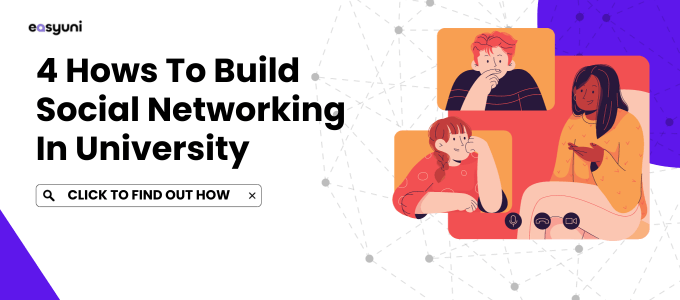4 Ways To Build Social Networking In University
November 07, 2023
Anis

Building a social network has become an essential part of university students. But how can a university student build a strong network?
You can build networking by participating in class activities, getting a part-time job, and being a committee event or organization.
These participations will equip you with readiness as you gain skills and experience to navigate your job and responsibilities.
Now, let's discover more about social networking in the following section.
What Is Social Networking?
Social networks provide platforms for people to connect and form relationships.
These relationships are built on, for instance, social media platforms like LinkedIn, Instagram, or X (formerly known as Twitter).
Individuals use social networks to promote their businesses, share tips, increase brand awareness, provide advice, offer criticism, and more.
But how do social networks work?
When you log in to LinkedIn, for example, you will find people sharing tips, experiences, and do's and don'ts.
Some share their thoughts in story-writing mode, while others write articles.
One way to build a social network is by sharing tips or articles, expressing similar experiences, or leaving your feedback in the comment section.
You can also keep tabs on the company or individual's postings. You might find valuable information such as job or internship openings, soft skills insights, and more.
By leaving comments or reactions like "Thank you for sharing," people will take notice of your enthusiasm for learning about the real working world.
Moreover, your followers might also find the posts you share on your profile useful. If they come across posts related to you, they will share them.
They might consider you the best candidate for the post because of your interest in the subject.
How To Build Social Networking At University?
1. Participate in class discussions

Have you considered running a background check on your lecturer before signing up for their class?
Some lecturers may have personal blogs where they share their writings on contemporary issues or their expertise.
If you take classes with such lecturers, you should equip yourself with basic subject knowledge beforehand.
It helps you to share fruitful opinions during class discussions and demonstrate that you are taking your education seriously.
As a university-level student, you are expected to behave like an adult and be more thoughtful of your future.
Your lecturer will notice your enthusiasm, effort, and knowledge during the class discussions. It could lead to opportunities such as internship placements suitable to your college major, skills, and knowledge.
Remember, when a lecturer offers you an opportunity like this, it is a sign that they believe in you and your potential.
This situation marks the beginning of a great journey.
2. Update your social media

It is common for young people to stay updated with the latest trends. Some of you might have multiple social media accounts, such as LinkedIn, X, TikTok, and more.
Whatever social media accounts you may have, you can utilize them effectively.
Surely, you have noticed how some business owners use their accounts to promote brand awareness and share tips?
Social media allow them to engage and build connections with their followers.
In fact, some business owners find new employees on social media by posting job vacancy by posting job vacancies and asking people to send their resumes via direct message (DM).
When people find their information valuable, they might DM the company's official account to request a job opening.
So, how can you build connections on social media?
You can share (or repost) information or funny posts. While it is your account, it is important to maintain a certain level of professionalism.
By staying updated with social media trends, you can approach companies and ask them questions that are related to the job positions.
3. Build your own personal brand
Building a personal brand is about how people perceive you online. As a university student, you can establish your name based on your course and interests.
A strong personal brand can help you stand out and open new career opportunities.
For instance, if you are a graphic design major, you can create cloud storage files to keep your design safe and organized.
This way, you can showcase your work to potential employers or clients and prove that you have experience designing different types of content.
By sharing your work consistently on social media platforms, you can also enhance your credibility and online presence, especially for freelance work.
It is advisable to put watermarks on your work to prove ownership.
Besides, consistency is key in establishing your identity and making it easy for people to recognize you.
In addition to sharing your work, you can also create and share quality content to boost your personal branding.
For example, if you enjoy writing, you can produce blog posts or share your writing pieces on LinkedIn. You will receive feedback to improve your ideas.
It is also important to engage with your followers and respond truthfully to their comments. Doing so helps to establish a positive online reputation with your audience.
4. Attend workshops and seminars

Usually, universities would organize workshops or seminars to improve the students' hard and soft skills.
By attending the events, you can expand your understanding and create connections with attendees.
Simple interactions such as grouping activities and brainstorming lead to new opportunities.
Moreover, participating in workshops and seminars can enhance your competencies.
It boosts you as a more attractive candidate to future employers.
Hence, if you see an opportunity to participate in the event, register and secure your seat.
It is a very insightful event for your hard and soft skills, self-esteem, and knowledge.
While building social networking is vital for university students, you must balance online and offline interactions.
Maintaining between online and offline interactions helps to nurture your overall well-being.
In conclusion, social networking can have a significant impact on your future.
It is not only about making new friends or professional connections.
But it is also about creating a personal brand and expanding your skills.
So, try to expand your connections, both online and offline, to gain more useful knowledge, experience, and working-life tips.
Kickstart your education in Malaysia
We'll help you find and apply for your dream university
You might be interested in...
- Promoting Health and Well-being: Initiatives by Universities in Malaysia
- Raising Awareness of the Threat of Microplastics Pollution on International Mother Earth Day
- Essential Tips for International Students Studying in Malaysia's Big and Suburban Cities
- Misconceptions About Studying in Malaysia: Insights for International Students
- Exploring Distance Learning: Course Offerings at Universities in Malaysia
- The Role of Education in Promoting Health Equity: Lessons from World Health Day 2024
- Studying Abroad Tips: What Should You Do Before Coming to Malaysia?
- International Students' Guide to Success in Malaysian Research Programs
- Returning Home or Staying Put: Planning Your Career Path After Studying in Malaysia
- Crafting a Greener Tomorrow: Empowering Change through Zero Waste and Upcycling Practices








